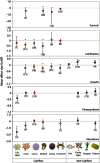Impacts of ocean acidification on marine organisms: quantifying sensitivities and interaction with warming
- PMID: 23505245
- PMCID: PMC3664023
- DOI: 10.1111/gcb.12179
Impacts of ocean acidification on marine organisms: quantifying sensitivities and interaction with warming
Abstract
Ocean acidification represents a threat to marine species worldwide, and forecasting the ecological impacts of acidification is a high priority for science, management, and policy. As research on the topic expands at an exponential rate, a comprehensive understanding of the variability in organisms' responses and corresponding levels of certainty is necessary to forecast the ecological effects. Here, we perform the most comprehensive meta-analysis to date by synthesizing the results of 228 studies examining biological responses to ocean acidification. The results reveal decreased survival, calcification, growth, development and abundance in response to acidification when the broad range of marine organisms is pooled together. However, the magnitude of these responses varies among taxonomic groups, suggesting there is some predictable trait-based variation in sensitivity, despite the investigation of approximately 100 new species in recent research. The results also reveal an enhanced sensitivity of mollusk larvae, but suggest that an enhanced sensitivity of early life history stages is not universal across all taxonomic groups. In addition, the variability in species' responses is enhanced when they are exposed to acidification in multi-species assemblages, suggesting that it is important to consider indirect effects and exercise caution when forecasting abundance patterns from single-species laboratory experiments. Furthermore, the results suggest that other factors, such as nutritional status or source population, could cause substantial variation in organisms' responses. Last, the results highlight a trend towards enhanced sensitivity to acidification when taxa are concurrently exposed to elevated seawater temperature.
© 2013 Blackwell Publishing Ltd.
Figures







References
-
- Abrami PC, Cohen PA, d'Apollonia S. Implementation problems in meta-analysis. Review of Educational Research. 1988;58:151–179.
-
- Adams DC, Gurevitch J, Rosenberg MS. Resampling tests for meta-analysis of ecological data. Ecology. 1997;78:1277–1283.
-
- Albright R. Reviewing the effects of ocean acidification on sexual reproduction and early life history stages of reef-building corals. Journal of Marine Biology. 2011 2011, Article ID 473615, doi: 10.1155/2011/473615. - DOI
-
- Albright R, Langdon C. Ocean acidification impacts multiple early life history processes of the Caribbean coral Porites astreoides. Global Change Biology. 2011;17:2478–2487.
Publication types
MeSH terms
Substances
LinkOut - more resources
Full Text Sources
Other Literature Sources
Research Materials

